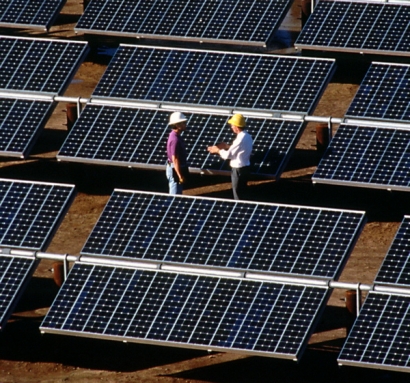
The White House slapped steep tariffs on imported solar panels and washing machines Jan. 22, a move intended to curb imports of cheap products from countries like China and South Korea.
The solar tariffs approved by the president will be enforced for the next four years, starting with levies of 30 percent that will ultimately fall to 15 percent.
In each of the four years, the first 2.5 GW of imported solar panels and cells will be exempted from the tariff, an exception designed to ensure that existing solar module manufacturers in the United States can still access less expensive supplies for their own production.
The administration said at the time that the tariffs are largely directed at China, which it says has flooded global markets with low-cost crystalline silicon panels.
But in a lawsuit filed in the U.S. Court of International Trade in New York, Silfab Solar Inc., Heliene Inc. and Canada Solar Solutions Inc. -- all headquartered in Canada -- say the administration exceeded its authority in imposing the tariffs and that as Canadian solar imports do not harm United States producers, the tariffs violate the Trade Act and the North American Free Trade Agreement.
According to the complaint, the International Trade Commission conducted "an extensive, months-long investigation" in 2017 to determine if imported CSPV cells, whether or not partially or fully assembled into other products, were a substantial cause of serious injury to the U.S. solar industry.
"The Commission concluded that global imports of CSPV products are a substantial cause of a serious injury to domestic CSPV manufacturers," the complaint said.
However, the plaintiff companies note, the commission also concluded that CSPV cells and modules imported from Canada do not account for a 'substantial share' of total CSPV imports, and do not 'contribute importantly to the serious injury' found by the Commission.
Furthermore, the Canadian companies say, "the commission failed to recommend to the President any action to remedy the serious injury it had identified."
“Because the proclamation is unlawful as applied to plaintiffs, and inflicts grave and irreversible harms on them, plaintiffs seek a declaration that the proclamation violates the Trade Act and the NAFTA Implementation Act and an injunction prohibiting its enforcements against plaintiffs,” the complaint says.
South Korea, Taiwan and the European Union have separately filed complaints in the World Trade Organization over the solar tariffs.
To view a copy of the complaint click here (It is in Adobe PDF format)

